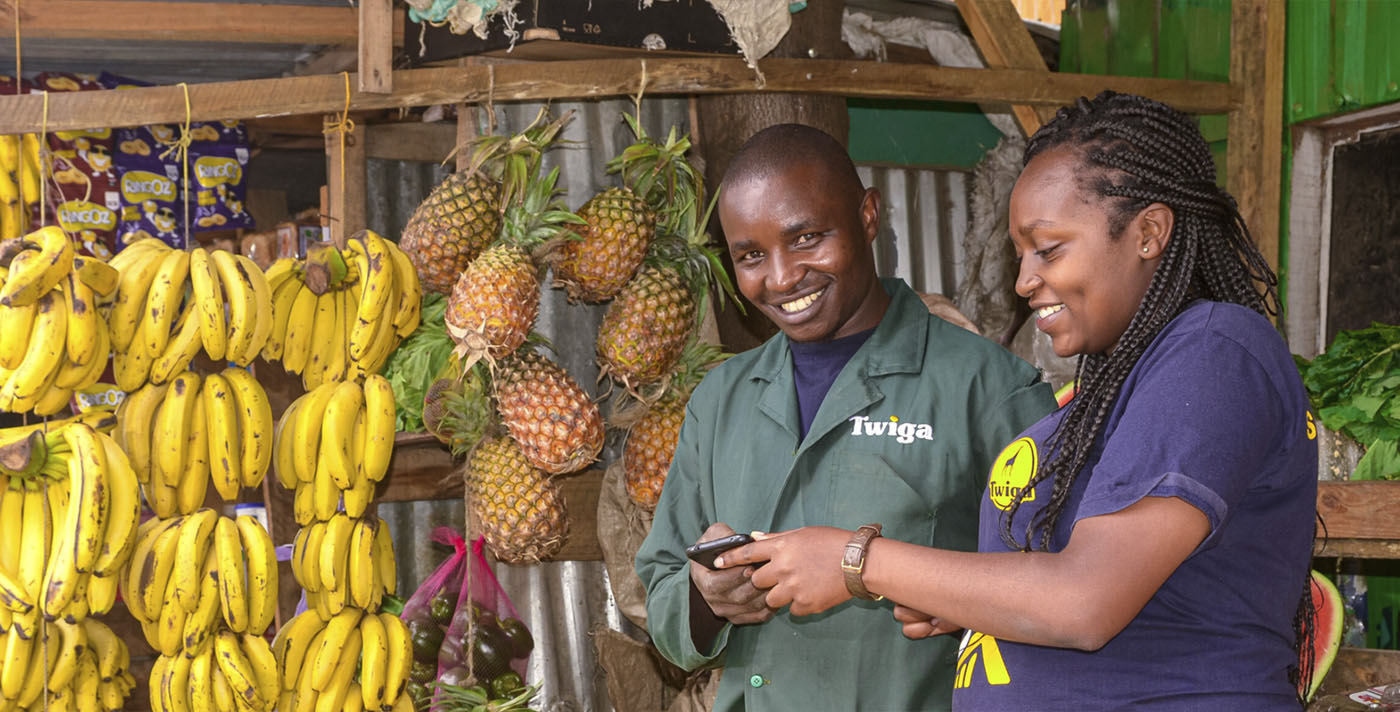Twiga Foods
The Go-To Operating System For The African Retail Landscape

The fragmentation of the African retail market has long produced inefficiencies in its food supply chain at the huge cost of the average consumer. Twiga Foods’ technology-enabled solution looks to change the disparity between the African and global supply chains. CEO Peter Njonjo spoke to us about how Twiga Foods is empowering farmers, vendors and manufacturers, whilst tackling food security in Africa.
As the World Economic Forum has acknowledged in its selection of the 100 Most Promising Technology Pioneers of 2020, Twiga Foods is fronting the new technological drive influencing a wide range of sectors in Kenya. Twiga’s B2B Platform is designed to streamline supply chains, with supply chains optimized through their platform following the analysis of retail demand. Since its foundation in 2014, its innovation is not only drawing attention from the likes of the World Economic Forum and global investors but through collaborations with the financial sector — it is also making a tangible difference to the lives of the country’s farmers.
Through its platform Twiga provides supply chains for farmers and vendors with a view to creating fair and transparent routes to consumers, as well as boosting the efficiency of agricultural operations. The process is simple. Post-registration, suppliers receive a purchase order from Twiga to set deadlines for delivery. After Twiga weights and harvests the produce, suppliers are issued with a receipt and paid within 24 hours. In signing up, suppliers guarantee themselves a market, access to transparent pricing, farming advice, and resources/credit from Twiga’s partners. On the other end of the chain, vendors place orders with Twiga sales representatives after being registered onto the system, with the produce being directly delivered by Twiga as well. Similarly, the level of transparency opens up quality produce for vendors, whilst tracking, free delivery and the same support from Twiga’s partners received by suppliers is all part of the experience.
The crux of Twiga Foods’ solution is in the fragmentation of the Sub-Saharan retail market.
With up to 90% of the retail industry being made up of small, independent retailers, the informal and inefficient supply chains result in African consumers “paying more for food and other goods than consumers in most developed markets, both in absolute and relative terms to their income,” as Peter Njonjo, Twiga’s CEO explains.
He highlights that the average U.S citizen is spending about 7% of disposable income on food, as opposed to the roughly 50% of the average Nairobi consumer.
Poor market access, fragmentation of the market, and the overall inefficiency of supply chains being the culprits.
The Twiga solutions look to invest in the supply chains themselves to slash post-harvest losses to below 5% as well as using technology-enabled aggregation to create “predictable models of daily consumption in cities”.
Njonjo is also quick to underline the importance of this technological know-how and its ever-growing importance in the current African market.
Mobile-led technology, in particular, is at the center of this transformation. Njonjo acknowledges that “we are witnessing a very significant shift from a technology perspective on the African continent.”
The rapid evolution of infrastructure and disruption of digital mobile services has also had a huge impact on Twiga’s setup as well, with the revenue of their mobile shooting from 10%-70% within twelve months.
“we are witnessing a very significant shift from a technology perspective on the African continent.”
Njonjo himself draws on a wide and prestigious range of experience.
He boasts a record which saw him take up positions as the President of the American Chamber of Commerce in Kenya, and Coca-Cola’s East-African CEO.
On top of this his accolades include being included as one of the top 100 young leaders in Africa by Forbes Afrique and “Top 40 under 40” by The Business Daily in Kenya.
He cites his experience as Coca-Cola being especially influential in his current position at Twiga as he was blessed with a “front-row seat in witnessing the challenges of distributing products where you have a highly informal retail industry.”
He adds that the “myriad of challenges” he came across in the Coca-Cola role gave him a valuable insight into the challenges Twiga needed to tackle to resolve the food supply chain efficiency issues which the Sub-Saharan region faces.
In terms of its journey, the company can be seen as a form of “Agro-Amazon”, given the development of their story.
Both companies began with a single product and then realised the potential for branching out into a wider-range of markets, given that the business model continued to hold water.
Njonjo describes Twiga’s growing maturity and widening of horizons as a natural progression.
Twiga “started out by selling bananas, but, every day we visited our customers, they asked us for more products and that is how we started expanding our portfolio to what it is today.”
He acknowledges the parallel, pointing out how Amazon “started with books and it made perfect sense, but, as they identified other needs within their customer base, their portfolio expanded to meet those needs over time.”
It was inevitable therefore, that Twiga would broaden its portfolio.

Thus far, the Twiga initiative has clearly turned the heads of investors.
In 2020 Twiga raised $23.75 in a Series B equity round fronted by Goldman Sachs and also featuring the likes of International Finance Corporation, TLcom Capital and Creadevm, with a further $6 million being raised from OPIC and Alpha Mundi.
The interest of such investors is having a knock-on effect, allowing Twiga to make big collaborations, which make a meaningful effect on the lives of farmers in Kenya.
In collaboration with IFC and Tier 1 Kenyan banks, a $30 million proposed investment is being put towards empowering medium-sized farms to build a healthier production ecosystem.
In doing so, Twiga Foods hopes to perform a “critical role” in taking on what Njonjo describes as the “elusive challenge” of food security in the African continent.
Twiga’s plans for African expansion are ambitious and stretch across the continent, with 4 strategic hubs being targeted — the East African hub (Kenya, Uganda, Tanzania, Ethiopia), the West African hub (Côte d'Ivoire, Ghana, Burkina Faso, Senegal), and The Central African hub (Democratic Republic of Congo, Angola).
Finally, “Nigeria will be a standalone opportunity due to its size” explains Njonjo. Beyond this strategic outline, the company is also eyeing public listing within the next five years, with the London and New York stock exchanges as well as NASDAQ or a “possible tie-up with a global strategic player” also being lined up.
Becoming the “one-stop shop for informal retail in the markets we operate” is what Njonjo cites as the company’s holy grail.
With the momentum brought out by consistent and significant investments and the collaboration of the Kenyan financial sector, the trajectory for the Twiga story continues to show promise and opportunity, as it looks to truly revolutionize the African agricultural sector.


